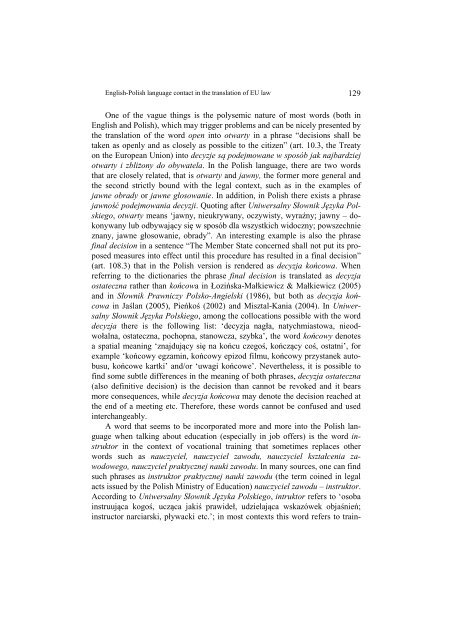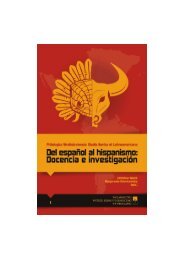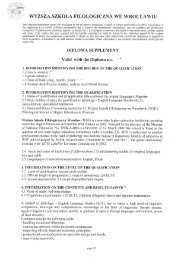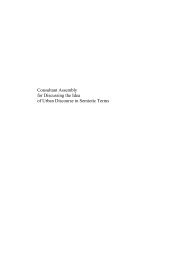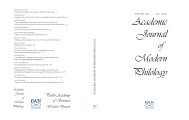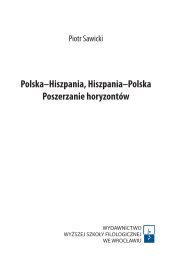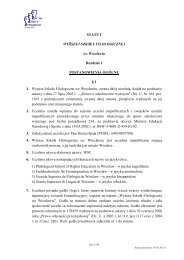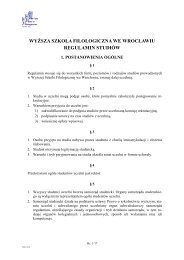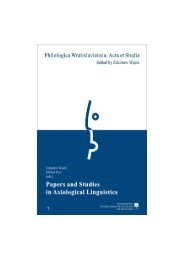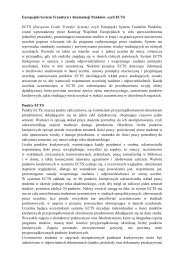s - Wyższa SzkoÅa Filologiczna we WrocÅawiu
s - Wyższa SzkoÅa Filologiczna we WrocÅawiu
s - Wyższa SzkoÅa Filologiczna we WrocÅawiu
Create successful ePaper yourself
Turn your PDF publications into a flip-book with our unique Google optimized e-Paper software.
English-Polish language contact in the translation of EU law 129<br />
One of the vague things is the polysemic nature of most words (both in<br />
English and Polish), which may trigger problems and can be nicely presented by<br />
the translation of the word open into otwarty in a phrase “decisions shall be<br />
taken as openly and as closely as possible to the citizen” (art. 10.3, the Treaty<br />
on the European Union) into decyzje są podejmowane w sposób jak najbardziej<br />
otwarty i zbliżony do obywatela. In the Polish language, there are two words<br />
that are closely related, that is otwarty and jawny, the former more general and<br />
the second strictly bound with the legal context, such as in the examples of<br />
jawne obrady or jawne głosowanie. In addition, in Polish there exists a phrase<br />
jawność podejmowania decyzji. Quoting after Uni<strong>we</strong>rsalny Słownik Języka Polskiego,<br />
otwarty means ‘jawny, nieukrywany, oczywisty, wyraźny; jawny – dokonywany<br />
lub odbywający się w sposób dla wszystkich widoczny; powszechnie<br />
znany, jawne głosowanie, obrady”. An interesting example is also the phrase<br />
final decision in a sentence “The Member State concerned shall not put its proposed<br />
measures into effect until this procedure has resulted in a final decision”<br />
(art. 108.3) that in the Polish version is rendered as decyzja końcowa. When<br />
referring to the dictionaries the phrase final decision is translated as decyzja<br />
ostateczna rather than końcowa in Łozińska-Małkiewicz & Małkiewicz (2005)<br />
and in Słownik Prawniczy Polsko-Angielski (1986), but both as decyzja końcowa<br />
in Jaślan (2005), Pieńkoś (2002) and Misztal-Kania (2004). In Uni<strong>we</strong>rsalny<br />
Słownik Języka Polskiego, among the collocations possible with the word<br />
decyzja there is the following list: ‘decyzja nagła, natychmiastowa, nieodwołalna,<br />
ostateczna, pochopna, stanowcza, szybka’, the word końcowy denotes<br />
a spatial meaning ‘znajdujący się na końcu czegoś, kończący coś, ostatni’, for<br />
example ‘końcowy egzamin, końcowy epizod filmu, końcowy przystanek autobusu,<br />
końco<strong>we</strong> kartki’ and/or ‘uwagi końco<strong>we</strong>’. Nevertheless, it is possible to<br />
find some subtle differences in the meaning of both phrases, decyzja ostateczna<br />
(also definitive decision) is the decision than cannot be revoked and it bears<br />
more consequences, while decyzja końcowa may denote the decision reached at<br />
the end of a meeting etc. Therefore, these words cannot be confused and used<br />
interchangeably.<br />
A word that seems to be incorporated more and more into the Polish language<br />
when talking about education (especially in job offers) is the word instruktor<br />
in the context of vocational training that sometimes replaces other<br />
words such as nauczyciel, nauczyciel zawodu, nauczyciel kształcenia zawodo<strong>we</strong>go,<br />
nauczyciel praktycznej nauki zawodu. In many sources, one can find<br />
such phrases as instruktor praktycznej nauki zawodu (the term coined in legal<br />
acts issued by the Polish Ministry of Education) nauczyciel zawodu – instruktor.<br />
According to Uni<strong>we</strong>rsalny Słownik Języka Polskiego, intruktor refers to ‘osoba<br />
instruująca kogoś, ucząca jakiś prawideł, udzielająca wskazó<strong>we</strong>k objaśnień;<br />
instructor narciarski, pływacki etc.’; in most contexts this word refers to train-


